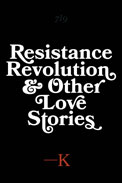
 |
From the opening tale, it is clear that this collection of twelve stories centering around love will be anything but conventional. Survivor's guilt devours the main character, Mustapha, who survives a bombing in Gaza that claims the lives of his neighbors and own brother, Khalid. In the privacy of his thoughts, he is unable to hide his attraction for Khalid's widow, Khalila, particularly knowing that the affection is reciprocated. However, outwardly he is resilient, thwarting any advances with the common statement that work needs to be done. The imagery of the fallen families, depicted by the metaphor of fallen branches, their limbs and bodies sprawled together yet mangled in every direction, is haunting. While love is central, the author's stories transcend beyond simple romance and dive into contextualized and developed worlds that add unique insight into what drives human behavior.
In "Calamity Jane," the author changes gears, delivering an attention-grabbing opening line: "Jane was a sweet girl once you got past the fact that she was a bitch." Simply put, the author has a knack for building characters that, while unorthodox, are irresistible and interesting. On the surface, this story could be perceived simply with the purely lust-filled lens of the on-again, off-again relationship of Jane and Jay. However, the perspective of Habib, the main character, provides a spin that is more focused on how much women are taken for granted in relationships. Needless to say, there are underlying themes to every story, albeit subtle, that impel audiences to spend a little more time unraveling the author's message.
As with Jane and Habib, the sexual tension is prevalent in numerous other stories. For example, in "The Hand," the main character is mesmerized by one of his supervisors, describing her moist lips and her black suit jacket as being "buttoned to just below her bust line; the silver buttons a fluvial shimmer against her white blouse." However, the Hand is strongly reminiscent of Orwell's Big Brother, always watching and controlling what memories are formed and even which memories can be kept (e.g., photographs).
On a similar yet different note, "The Conversation" features a blind character whose sexual tension with the pizza guy is palpable. But digging deeper, the reader can relate with her desire to be free from the shackles and constraints placed by her mother (who encourages Silvia to stay indoors) and the constant juxtaposition of what a parent perceives as protection with what the child feels is suffocation. Perhaps the most intriguing of the stories is "Head Down," where the instant attraction between Joseph and Shannon, both physically and from a personality standpoint, intersects with Joseph's tension in an unhappy marriage. A five-day information technology conference in Calgary turns into a whirlwind of passion and romance for the two with lingering effects.
From dystopian stories featuring Game of Thrones-esque great walls, an automaton with a mind of its own, and Greek mythology adaptations to inspired dogs inciting resistance and gardening being a metaphor for life, an element of the unexpected is embedded within each story. Undoubtedly eclectic, each selection takes on a life of its own with electrifying energy and the ability to incorporate themes that will keep ruminating in readers' minds long after the story is finished.
RECOMMENDED by the US Review
Next Focus Review
Previous Focus Review